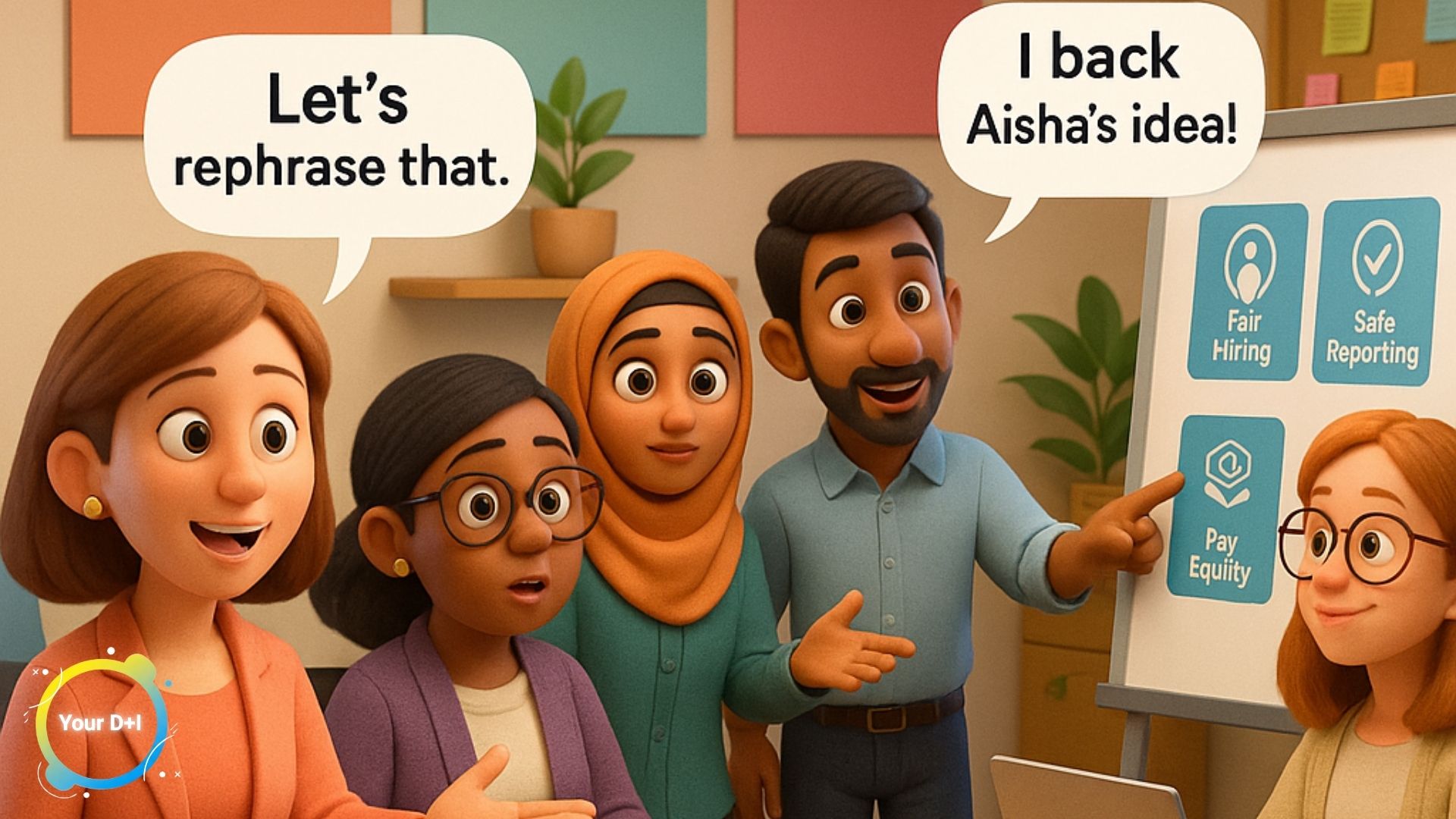What anti-racism actually means (and why “not racist” isn’t enough)
“Not racist” is passive. Anti-racism is active: challenging policies, behaviours and systems that produce unequal outcomes for racialised people. In workplaces, that means going beyond nice statements to concrete changes in hiring, pay, promotion, language, safety, suppliers and data. It’s a habit, not a hashtag.
Performative allyship vs effective allyship
Performative allyship is visibility without vulnerability or accountability. Effective allyship is behaviour that reduces harm and increases equity—even when no one’s watching.
Spot the difference:
Statement vs shift:
Performative: Posting a black square.
Effective: Publishing your ethnicity pay gap and a time-bound plan to close it.Centred on self vs centred on those impacted:
Performative: “I’m learning so much.”
Effective: “Here’s what we changed, who it helps, and how we’ll be held to account.”One-off vs ongoing:
Performative: A single training session.
Effective: Quarterly audits, manager coaching, policy updates, and tracking results.Optics vs outcomes:
Performative: Diverse photos on the website.
Effective: Diverse hiring panels, structured interviews, and monitored shortlists.
Before you start: check your role and power
Allyship looks different depending on your position.
Individual contributor: learn, speak up, log issues, use reporting routes, join ERGs, mentor/sponsor peers.
Manager: set team norms, intervene early, approve adjustments, block biased decisions, escalate patterns.
Leader: resource the work, set goals, publish data, tie outcomes to performance, back your people publicly.
10 practical ways to practise anti-racism daily
Interrupt microaggressions in the moment
Try: “Let’s not use that phrase—it stereotypes. Here’s a better way to say it.” Follow up with the person impacted privately: “I’m sorry that happened. How can I support what you need next?”Standardise hiring
Use structured interviews, job-related criteria, skills tasks, and diverse panels. Remove names/schools from CV screens. Track pass-through rates by stage.Close pay and progression gaps
Run pay equity checks twice a year. Publish bands internally. Require written criteria for promotions with evidence.Fix performance reviews
Replace vague “culture fit” with clear, role-based behaviours. Add calibration meetings and second-reader checks.Set clear language and conduct norms
Write a plain-English policy on banter, slurs, stereotypes and “jokes”. Practice with scenarios in team meetings.Create safe reporting routes
Multiple channels (line manager, HR, anonymous). Share “what happens next” flow. Track time-to-action and outcomes.Resource ERGs (without dumping the labour)
Give budget, leadership access and work time. Recognise the load—compensate leads or reduce other targets.Diversify suppliers and partners
Add inclusive procurement criteria. Track spend with ethnic-minority-owned businesses.Learn out loud—but don’t centre yourself
Book clubs, lunch-and-learns, paid speakers. Credit and pay educators. Share what changed as a result.Measure and iterate
Pulse questions on safety/fairness/belonging, ER case trends, hiring and pay data, retention of racialised staff, and promotion rates.
When harm happens: use A.C.T.
Acknowledge: “That comment was unacceptable. I’m stopping the meeting.”
Centre needs: Ask the person impacted what they want (document, escalate, facilitated conversation). Don’t demand emotional labour.
Take action: Record facts, apply policy consistently, follow through, and communicate outcomes you can share.
If you’re the one who messed up: name it, apologise without excuses, change the behaviour, and accept consequences. “I used a stereotype. I’m sorry. I understand why it was harmful. I’m updating the deck and will address it with the team.”
How to talk about anti-racism with your team (quick scripts)
Setting the tone:
“Our goal is a workplace where everyone has dignity and equal opportunity. That means we’ll name racism when it shows up and act on it.”Calling-in a comment:
“Let’s pause. That phrase plays into a stereotype—can we reword?”Backing someone in the room:
“I want to return to Aisha’s idea—here’s what I heard and why it solves the problem.”
Common pitfalls to avoid
Centring your feelings (“I feel attacked”) instead of the impact.
Saviourism (speaking over people) instead of amplification.
Paralysis from perfectionism—progress beats pristine statements.
Policy theatre—policies without training, practice or enforcement.
Data without action—publishing numbers but not funding fixes.
Measure what matters (and report it)
Track these quarterly and share a one-page Impact Note:
Representation by level and function
Hiring pass-through rates
Pay equity gaps (mean/median)
Promotion rates and time-in-role
ER cases: volume, type, time-to-action, outcomes
Pulse: speak-up safety, fairness, belonging, manager action
A simple 30-60-90 day ally plan
Days 1–30 (Listen & baseline)
Review policies, hiring data, pay equity, ER cases.
Run a short pulse on safety/fairness/belonging.
Set two immediate norms (e.g., no-interruptions rule; “call-in” scripts).
Days 31–60 (Build & train)
Introduce structured hiring, bias-resistant reviews, and reporting flow.
Train managers on intervention and documentation.
Announce goals (e.g., halve time-to-action on ER cases by Q2).
Days 61–90 (Act & publish)
Fund ERG time; set sponsor/mentoring matches.
Publish an action note with timelines and owners.
Share early results and next steps.
Collaboration is key
We know for a more inclusive world we need to come together to create change. That is why we partner with the amazing Chikere Igbokwe of Inclucive. Chikere’s anti racism and allyship work is incredibly important. If you’d like to know more about the amazing Chi and if you are serious about becoming an anti racist organisation click the link!
Hello, my name is Chikere, and I’m the founder of Inclucive and Allyship.
I created Inclucive to help individuals and organisations move beyond good intentions and take meaningful action toward inclusion. As a Black woman and someone who has worked in the DEIB space for many years, I know how powerful Allyship can be—when it’s done with care, courage, and consistency.
Inclucive is a Black woman-led culture and Allyship consultancy. We support organisations to embed inclusion at every level—from everyday conversations to strategic leadership decisions. Through workshops, coaching, and our flagship Allyship Ambassador Programme, we equip people with the tools, language, and confidence to create real, lasting change.

